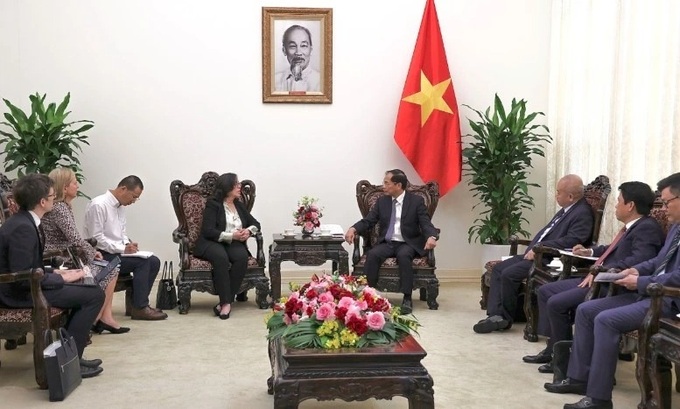
Deputy Prime Minister and Minister of Foreign Affairs Bui Thanh Son (R) receives Vice President of the World Bank Manuela V. Ferro.
Vietnam pledges to enhance the partnership with the World Bank (WB) and hopes to continue cooperation in programs aimed at promoting sustainable growth, green economy, digital economy and circular economy in the near future, said Deputy Prime Minister and Minister of Foreign Affairs Bui Thanh Son at a reception in Hanoi on November 20 for the visiting Vice President of the World Bank (WB), Manuela V. Ferro.
Showing his enthusiasm to welcome Ferro to the nation and to congratulate Mariam J. Sherman in her new role as new country director for Vietnam, Laos and Cambodia of the WB from May 1, Deputy PM Son appreciated the WB's decision to establish a regional office in Hanoi to be in charge of Vietnam, Laos and Cambodia; sharing a keen desire to closely co-operate with the regional office.
Deputy PM Son highlighted the WB as a close and reliable partner that has significantly supported Vietnamese socio-economic development.
Regarding the implementation of WB loan projects in the 2023 to 2024 period, the Deputy PM said that the Government has recently set up a working group led by the Deputy Minister of Planning and Investment to closely co-ordinate efforts with the WB Office in Vietnam in order to review and address challenges related to the preparation and implementation of WB projects.
This will therefore help to shorten the preparation and approval time, especially when there are differences between Vietnamese and WB regulations. In addition, the two sides need to co-ordinate closely to deal with the challenges facing specific projects.
The Deputy PM welcomed the WB’s proposal to lend money to the nation over the next five years, focusing on key areas such as infrastructure, specifically large-scale transport projects; energy, such as energy transition and renewable energy; and agriculture, including environmentally beneficial initiatives such as low-methane rice projects.
He called on the WB to continue simplifying the approval process and applying a flexible approach during negotiations in a bid to address challenges. He also encouraged the WB to explore and provide more non-refundable aid to mitigate the impact of high-interest loans from the International Bank for Reconstruction and Development (IBRD) when Vietnam graduated from ODA (WB’s International Development Association (IDA) capital) in 2017.
Deputy PM Son also suggested that the World Bank Regional Office continue to work closely alongside relevant Vietnamese agencies to study and propose solutions aimed at shortening preparation time and enhancing the resolution of cases of differences between Vietnamese regulations and those of the WB.
Acknowledging Vietnamese success in economic development over recent times, Ferro said that the purpose of this working trip is to discuss how the nation can become a high-income country by 2045.
That greatly depends on internal and external factors, particularly as Vietnam has benefited from the openness of international trade, she added.
The WB is looking forward to supporting the country in seeking opportunities, identifying risks, and appropriate investments to realize the proposed scenarios for its development path.
The institution is seeking to integrate technical assistance activities into its financing activities, always providing support appropriate to the context and development investment needs, and stands ready to support the nation in its future development.
Ferro noted that there has been an improvement in the disbursement progress of WB loan projects in the nation, but it remains slow.
According to her, one of the advantages of Vietnam having a higher income is that it has the conditions and ability to access the international financial market, mobilize competitive domestic capital, and mobilize capital from many different sources to serve its development process.
